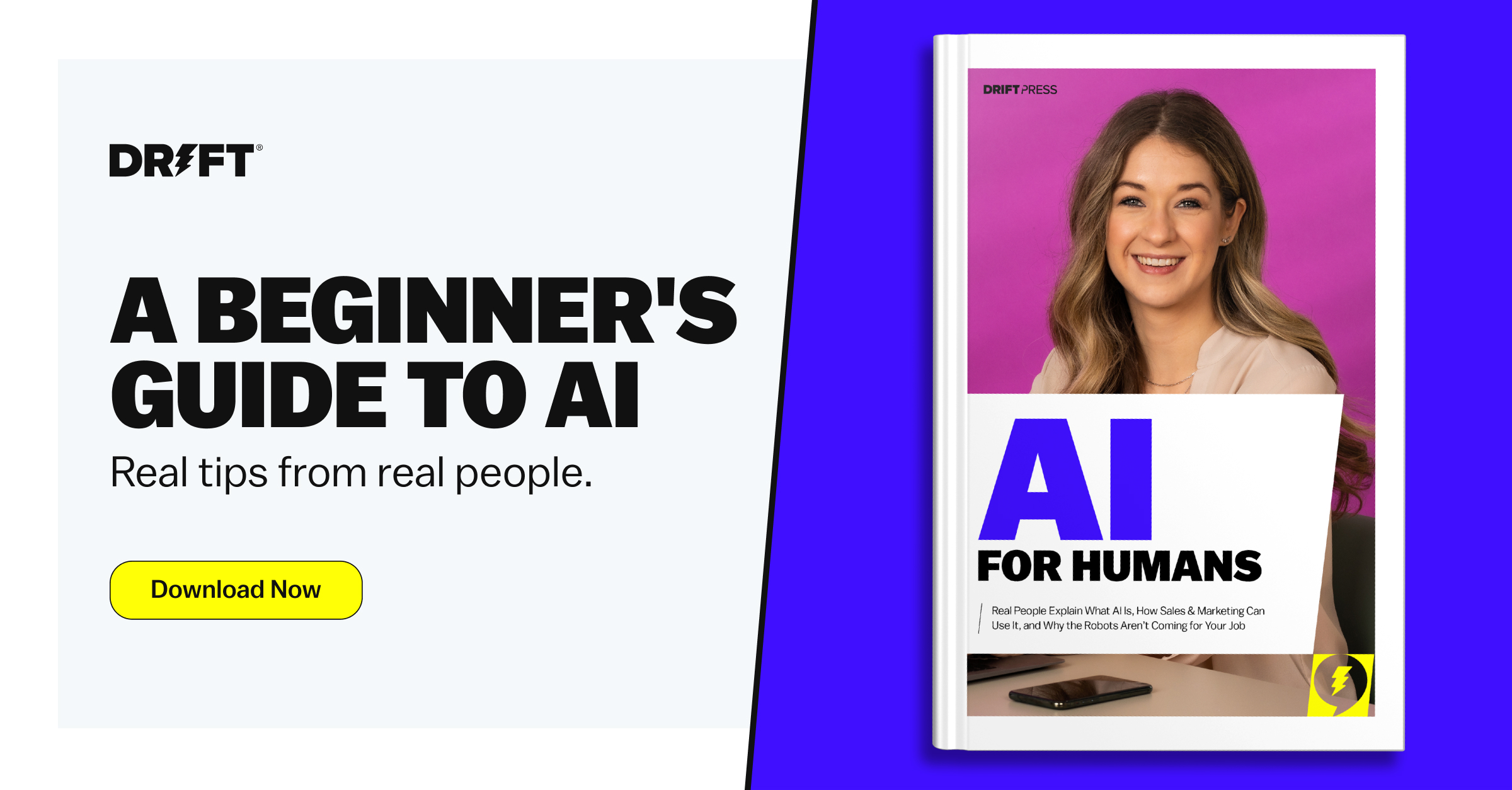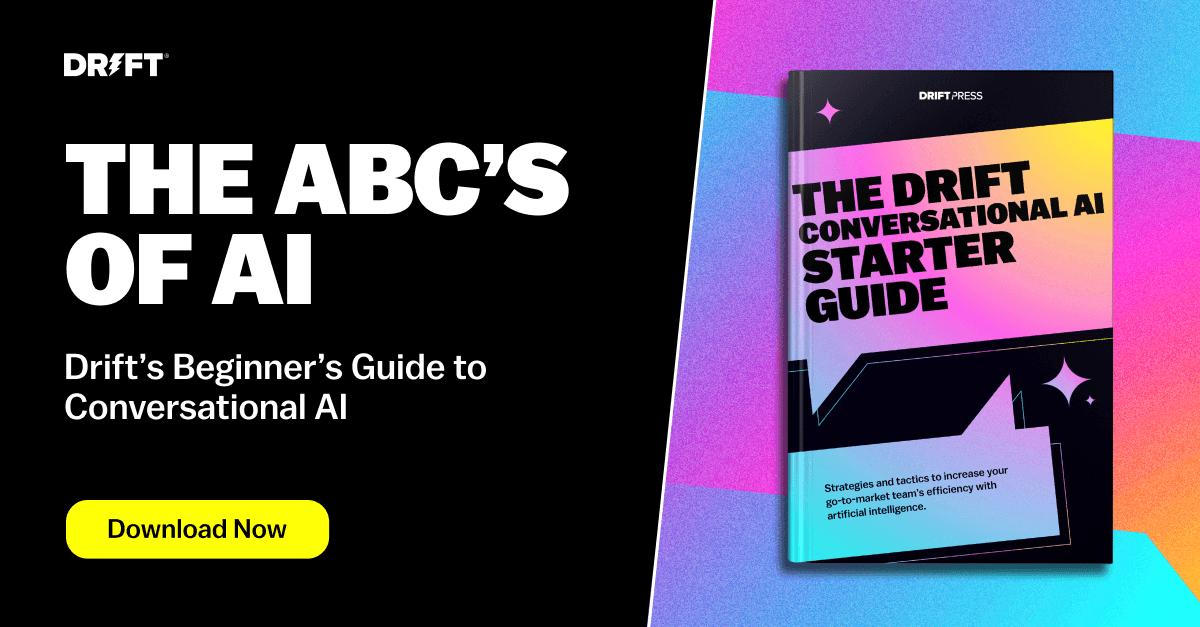For years, artificial intelligence (AI) technology felt like something out of a science fiction movie.
Now, with the explosion of new tools on the market like ChatGPT and Google’s Bard, everyone is scrambling to figure out what our lives and, more importantly, our work will look like with bots in the mix. And that’s especially the case for sales.
Hold on though. Robots won’t be coming for your jobs just yet.
You’ve likely seen this bell curve before. Developed by E.M. Rogers in 1962, this curve divides the market into five parts when it comes to adopting new technology: innovators, early adopters, early majority, late majority, and laggards.
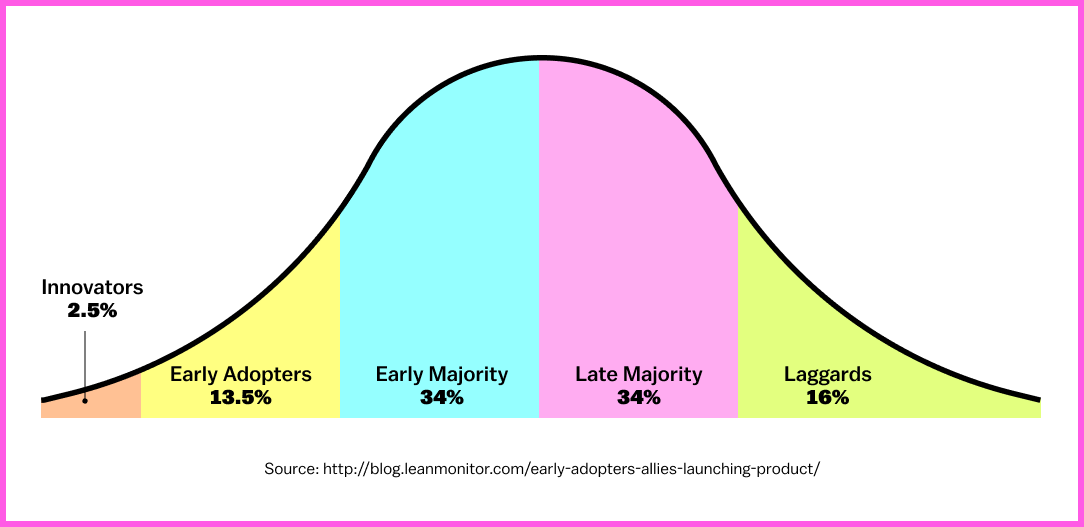
Right now, we’re still firmly in the “early adopters” stage. That said, the best sales reps have already adopted AI. According to Salesforce, high-performing sales teams are 1.9x more likely to use AI than underperformers.
Early adopters of sales AI are moving faster and more efficiently than ever before, using this new technology to help crush their quotas. With sales AI adoption projected to increase by 20% in the next two years, it’s clear that if you don’t start implementing AI now, you’re going to get left in the dust by your competitors.
Today, we’re looking at what AI for sales looks like, why more sales teams are adopting AI, and a few tactics and strategies you can use in your own sales process.
What Is AI in Sales?
AI in sales is the use of artificial intelligence to power sales processes like lead scoring, pipeline management, prioritization, outreach, forecasting, and more.
What makes AI useful is that it can help make sense of the huge swaths of data available to sales folks today so they can make more informed decisions. This means you can use AI to automate repetitive tasks and automatically generate key takeaways and insights that make your team more efficient and effective.
For sales teams, machine learning tools are particularly useful as they analyze customer data to identify new patterns and behaviors to use in forecasting and personalization. And of course, we can’t go without mentioning generative AI, which you can use to take existing data and generate content like emails, chat responses, and talk tracks.
Why Sales Teams Are Adopting AI Now
The right sales technology can empower your sales team to be more efficient and effective — and ultimately boost your sales productivity. This matters because 79% of sales executives say improving the productivity of existing sales reps is the key to hitting new targets.
But “do more with less” is a great mantra until you’re actually trying to do it. It’s like walking up a mountain in flip-flops. Doable, but not easy. (And it takes way longer, too.)
According to Forrester, B2B sellers work a 52-hour work week but spend less than 25% of their time directly selling. And with organizations everywhere planning to cut back on headcount and budget, hitting sales goals just got a lot more difficult.
That’s where AI can help you rise to the challenge. By leveraging AI in sales, you can free up time for your sales reps, focus on the deals that matter most, and quickly provide information to drive more productive conversations. So, if you’re looking to boost rep productivity and close deals faster, you really might want to consider AI as your next “hire.”
Benefits of Sales AI
Good reps are constantly reaching out to potential buyers — whether it’s via phone, email, or LinkedIn.
But great reps know how to use their time effectively so that when they reach out, they know they’re getting a positive response. While AI won’t ever replace hiring a real person, it does help make your team more efficient.
Done right, AI can turn your good reps into great ones by massively boosting their productivity. Some of the benefits of sales AI include:
- Immediacy: Today’s buyers bail if they’re not seeing quick, detailed, expert answers to their questions — never mind if they can’t reach a rep at all. If you want to meet your buyers where they are, AI chatbots can provide instant responses to inputs from site visitors, qualify leads through conversation, and automatically route high-intent leads to the correct sales rep, 24/7. Qualified leads can also book a meeting through the chatbot if a rep isn’t available to chat, no waiting required.
- Efficiency: AI can help direct sales reps on how to best spend their time, surfacing key insights into hot vs. cold leads and prioritizing them based on how likely they are to buy. Rather than starting in the phone book with the “A’s” and working forwards, reps can focus on the prospects that want to hear from them first. Since AI takes care of a lot of the research and insights, sales reps can take the right action with the right accounts faster and with less effort.
- Effectiveness: Not only does AI help sales reps decide when to reach out to a lead, but it also helps reps figure out what to say. With the insights gathered by the AI, sales reps can better understand what their leads are looking for based on onsite behavior, chatbot conversations, outreach they’ve interacted with, etc. This makes it so that, when reps do reach out, they can lead with a message that they know will grab the prospect’s attention and they can hold more quality conversations that drive conversions.
- Bandwidth: According to McKinsey, about a third of all sales tasks could be easily automated with today’s technology. Sales AI tools can cut down on repetitive administrative tasks like manual data entry or rote follow-up emails. These shortcuts help sellers focus on the activities that truly matter to the bottom line.
Essentially, AI gives you an extra pair of (digital) hands so that your sales team can move more quickly, efficiently, and effectively. And the numbers prove this: McKinsey predicts that the boost to productivity from generative AI alone could add up to $4.4 trillion in value annually — which is more than the entire GDP of the UK in 2021.
How to Use AI for Sales
It’s no exaggeration to say that AI can fit into every part of the sales cycle. In our State of Marketing and Sales AI report, we found that today’s sales pros are already using AI to measure campaign and channel effectiveness, build more targeted content plays, and forecast high-performing content.
Here are a few more ways you can incorporate AI into your own sales processes:
1. Qualify Website Visitors 24/7
If you want to close a deal, you have to be ready to deliver a personalized experience whenever your buyers want to hear from you. But your reps are only human — they have to clock out sometime.
Instead, you can rely on AI chatbots to greet website visitors, 24 hours a day, 365 days a year, no matter what time zone or language. That way, you can always catch your site visitors at just the right moment and qualify them to determine whether they’re ready to buy or need more information.
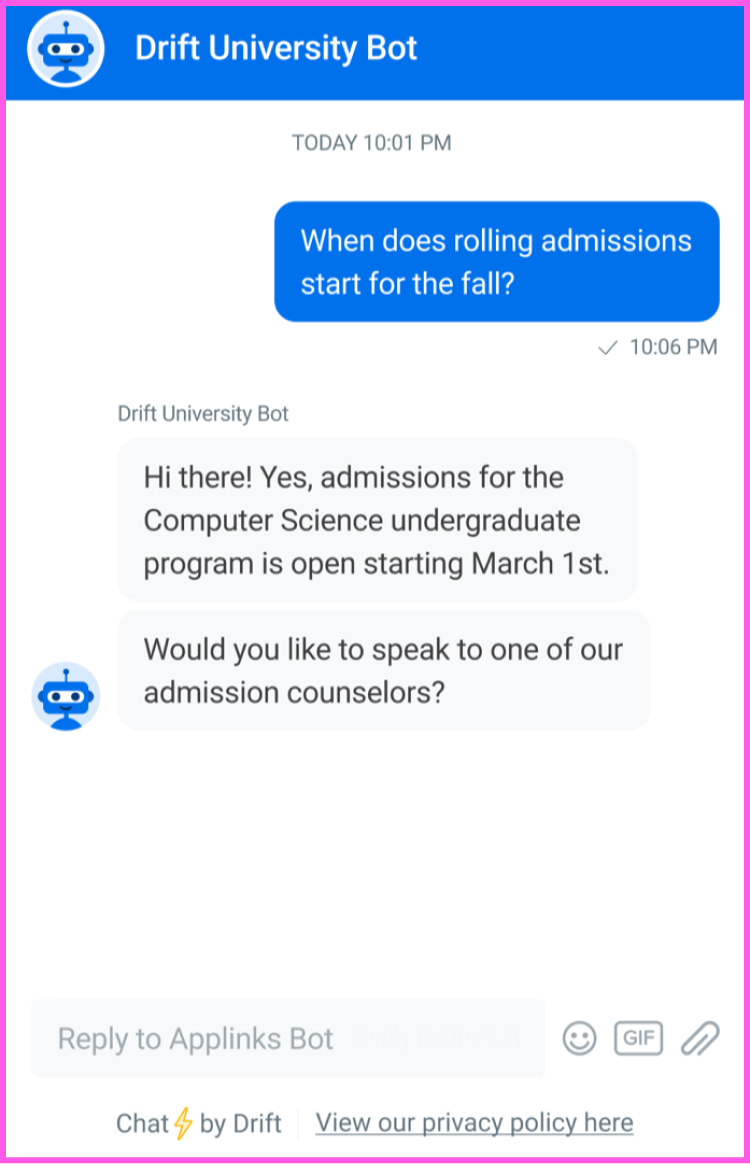
The best part? AI chatbots can ask open-ended questions (like “How can I help you today?”) to meet visitors where they are in the buying journey. Visitors can type a message as they would when replying to a human, and the AI chatbot can deliver the right responses and resources or guide them to where they want to go. No forms, no generic questions, and no decision trees. Just personalized, authentic conversations.
2. Suggest Replies in Chat or Email
We’ve all been there: You’re in the middle of a conversation with a prospect, but then they ask a question you don’t know the answer to — or one that requires you to dig through six different folders for the right document to share.
All they see is the dreaded “three bubbles” as they wait for you to reply.
Instead of searching, typing, and retyping an answer in chat or email, generative AI tools can provide a suggested reply with the right words and phrasing immediately. Drift’s AI suggested replies in live chat allow sales reps to answer questions right away without having to leave the conversation to find what they need. Plus, the response will already be personalized based on your business and the context of the current conversation, meaning that as long as the rep is happy with the suggestion, all they’ll have to do is click send.
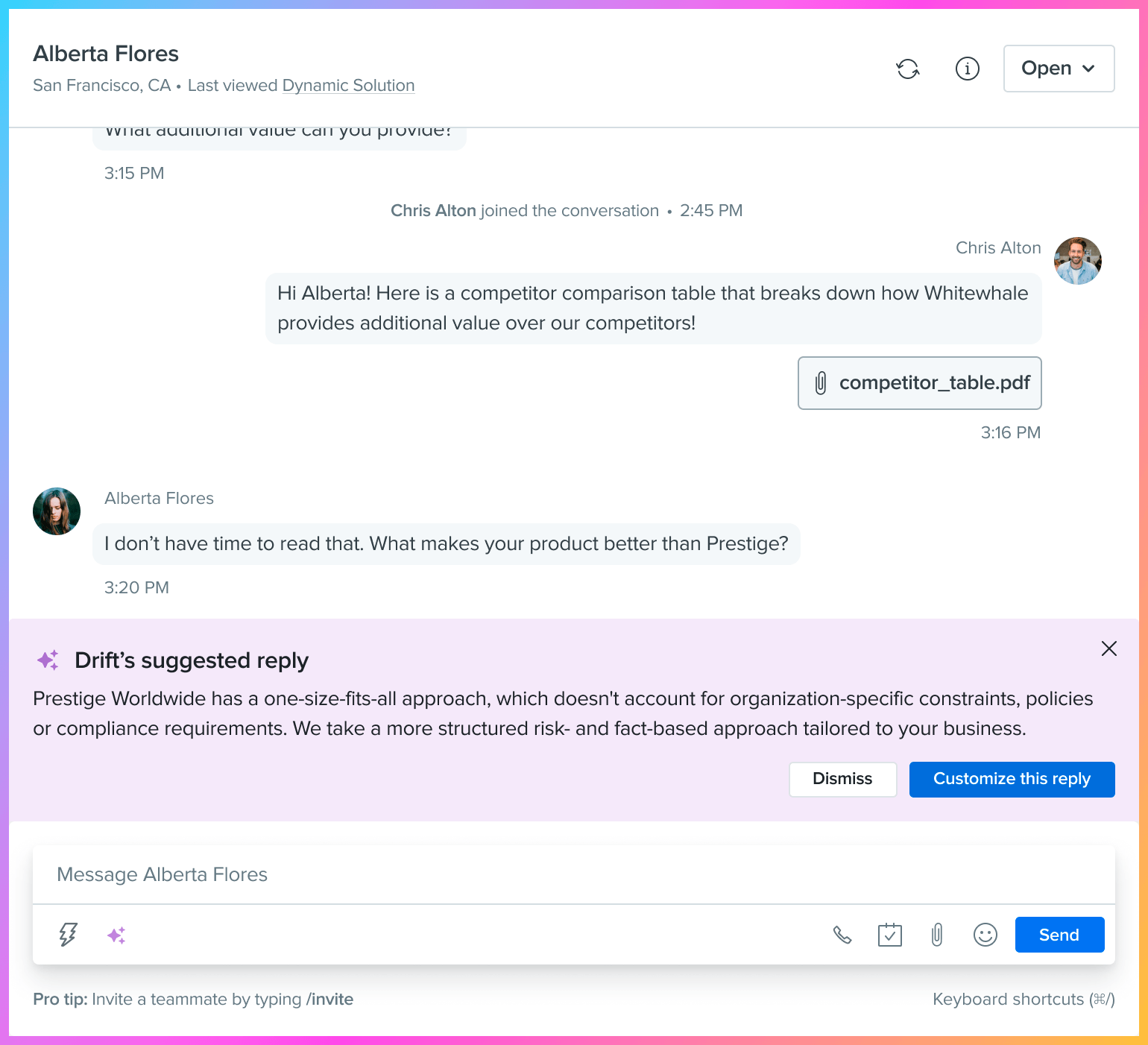
In addition, generative AI can help reps overcome language barriers in chat conversations. Our GPT Translations can instantly translate customer messages and suggest an accurate reply in that same language. This means sales reps can chat with site visitors from around the globe in the language that they prefer, resulting in more at-bats for your sales team.
3. Transform Data into Insights
If you’ve got 50 target accounts and just 30 minutes to spend on outbound prospecting, who are you going to call?
Sales organizations today don’t have the time for reps to dial down the alphabet. AI helps you make the most of your time by synthesizing pipeline data from multiple sources to pinpoint which accounts are most likely to convert. For example, Drift’s AI-powered engagement score pulls activity data from across your website and your tech stack to calculate how engaged an account is, making it easy to go after the accounts that are showing strong intent to purchase.
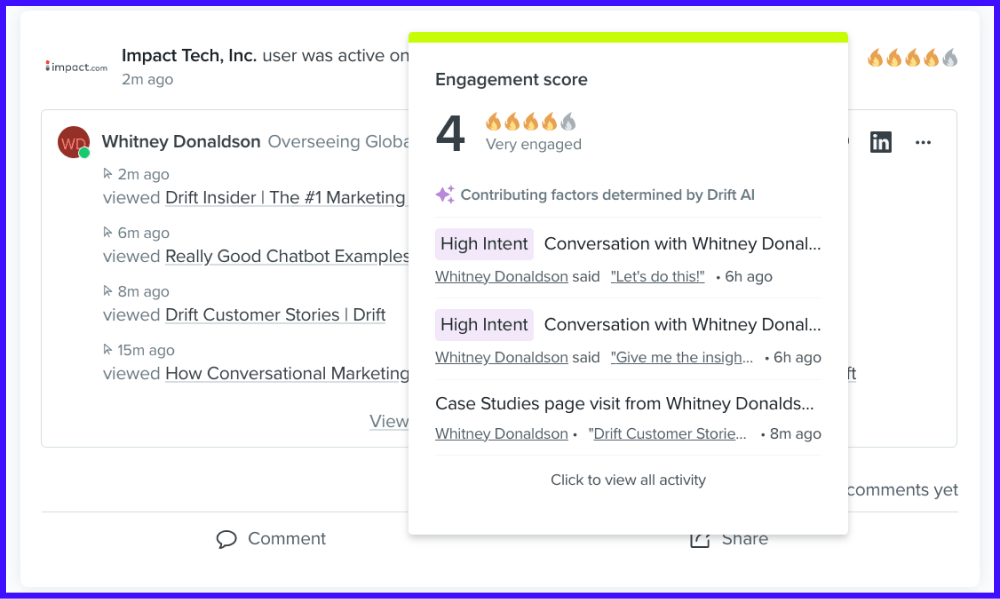
Tools like this turn all of the data that is already at your disposal — like site visits, email activity, conversation records, video views, job titles, and meeting data — into insights that you can take action on. What’s more, with this data, your AI can also forecast pipeline more accurately, so you have a better understanding of how far along you are against your quota.
4. Coach More Effectively
Managers can’t sit in on every single sales call. But many video calling platforms now offer AI-powered transcription which allows both the rep and the manager to comb through calls to determine what went well and what could be improved.
The same is true for other text-based communication, like chat or email. Using AI, you can analyze conversations from the same rep or from your entire team to determine patterns like common objections, keywords or phrases, and drop-off points. AI also allows you to monitor performance in real time by tracking deals and pipeline management for each rep as well as capturing and analyzing conversation data.
If you hire large classes of reps, this kind of analysis can help pinpoint individual strengths and weaknesses early on, as well as trends across the entire team, so you know where you need to spend more time training.
5. Make Sales Enablement More Efficient
Most marketing and sales teams don’t talk as much as they should. (Cats and dogs, we know.) But alignment between sales and marketing is essential for closing successful deals.
AI can boost your sales enablement efforts by helping organize the large library of content your marketing teams have worked hard to create, whether that’s case studies, slide decks, reports, etc. Then, depending on the buyer’s deal stage and conversation topic, the AI can recommend the assets that will resonate the most, which the seller can push in their next interaction.
Beyond recommendations, AI can help generate sales-specific documents, especially if there’s an established template. For example, if you want to be quick on the follow-up, you can use AI to generate a meeting recap from call notes or recordings. This allows your sales reps to get a head start on their follow-up messages so that you can keep the deal momentum going.
6. Get More Accurate Sales Forecasts
Whether you’re trying to predict future sales outcomes or gain better insight into market trends, there’s only so much data that a human can analyze before you end up overwhelmed.
This is where AI is especially useful — and that’s a point that many sellers agree on. In fact, in our State of Marketing and Sales AI report, we found that forecasting was one of the top 10 AI use cases named by sellers.
Since an AI can analyze large amounts of complex data, it can deliver sales forecasts for your team quicker than any human can. Not to mention that these AI-generated forecasts are more accurate because the AI is able to take into account data from multiple sources, whether that’s across your tech stack or outside of it.
Moreover, by removing the manual work that goes into sales forecasting, an AI tool can provide real-time forecasting that is responsive to changes in the market or overall economy. As a result, your sales team can always have reliable, up-to-date forecasts that will help them make smarter decisions about their strategy.
Popular AI Sales Tools
AI is everywhere these days, but the term actually refers to several different kinds of tools sales teams can use. The most popular out there include:
- Conversational AI: Conversational AI is a form of AI that enables conversations that come close to human-to-human interactions. With Drift Conversational AI, site visitors can ask open-ended questions in chat and get answers in real time. This means visitors can find answers to their questions on their own, get personalized recommendations, or book a sales meeting 24/7.
- Generative AI: While this isn’t exclusively a sales tool, generative AI solutions like ChatGPT, Bard, and Bing AI can make writing sales emails and follow-ups easier. Just beware of blind copy-and-pasting — these tools aren’t always accurate (yet) which means they’re best used as a starting point.
- Revenue Management AI: Intelligent pipeline management is much easier with revenue AI platforms like Clari, Dialpad, and People.ai. Platforms like this surface relevant, data-driven insights based on prospect and customer behavior so your sales reps know exactly which deals to focus on and when.
As AI becomes more accessible, we’ll likely see all kinds of software incorporating AI-powered features and insights. Adoption of AI has more than doubled since 2017 with almost half of all businesses using AI in one way or another, according to McKinsey. And, with the splash that AI tools like ChatGPT have made, we can only expect the interest in and adoption of AI to continue growing.
In short, you can’t hide from AI forever — so, building it intentionally into your sales strategy now is what’s going to help your sellers excel in the future.
Building an Impactful AI Sales Strategy
“AI” isn’t a sales strategy by itself. But it is a tool you can incorporate into your entire sales process from start to finish. When done right, AI can be the engine behind your customer-centric sales and marketing strategy.
Customer-centricity is now more important than ever. Buyers today expect immediate and accurate service that is personalized to them. Your prospects don’t want to jump through hoops to figure out whether you can actually solve their problem. Even if it is easier on the backend or “that’s just how we’ve always done it.”
Implementing a tool like AI revolutionizes what your sales strategy looks like — putting buyers at the center of every interaction. AI empowers you to do that on an individual and team level by helping you:
- Engage with buyers on their terms, when their attention and intent are highest, through predictive engagement scores, intelligent account recommendations, and always-on AI chatbots.
- Understand buyers by automatically qualifying leads based on short chat conversations and routing to the correct rep. AI also collects additional conversational data that allows you to personalize the relationship even further.
- Recommend what’s best for the buyer based on the insights provided by AI so you can educate them with relevant resources, build trust, and find a personalized solution for them.
When it comes to implementing AI, start by thinking through the entire buyer journey and your critical touchpoints. Figure out where your deals are most likely to fall through and work backwards. For example, are your reps struggling to find qualified buyers in the first place or do you lose momentum when following up after a demo? This will help you determine where AI will be most useful for your business, and then you can go from there.
Level Up Your Sales Team with Drift Conversational AI
“Do more with less” is actually possible with AI on your side. And that’s exactly what we’re here for at Drift.
With Conversational AI, you can deliver the tailored, frictionless experience that your customers expect…without having your reps online 24/7. Through real-time, humanlike conversations, our Conversational AI will help you engage and qualify buyers on your website, automatically deliver personalized experiences that convert, and empower customers to resolve issues on their own — while collecting valuable conversational insights.
Plus, with Drift x GPT, you’ll have the ultimate cheat code for building relationships, unlocking rep productivity, and driving pipeline. As we continue to enhance our existing capabilities with GPT, including AI suggested replies and GPT translations, you’ll be able to deliver even more intelligent and personalized chat experiences on your website with less work. Learn more here or get a demo.






